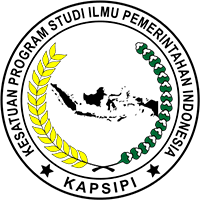Implementasi Rekrutmen Anggota Partai Keadilan Sejahtera (PKS) di Kota Balikpapan
DOI:
https://doi.org/10.35941/jip.v9i4.908Keywords:
Implementation, Political Recruitment, Political Recruitment Patterns, Political Recruitment ProcessAbstract
The research aims to determine the success or failure of a political party as measured by the recruitment implementation it has developed. The success of implementing this recruitment can be measured from the pattern and process of political recruitment used. The manifestation of the sustainability of political parties is the emergence of members who have the capability and commitment to the dynamics of political parties for the future. This research was conducted at the DPD PKS Office in Balikpapan City. This study uses Lili Romli's political recruitment theory. This type of research is descriptive qualitative using qualitative research data analysis techniques. The results of the study show that the implementation of the recruitment of PKS party members in Balikpapan City has been going quite well. Member recruitment was carried out in a persuasive manner which began with outreach in the form of promotions, social activities and individual activities aimed at showing the existence of the PKS party to the public so that they would be interested in becoming party members. By using an open political recruitment pattern, it is intended that the public can clearly understand the programs of the PKS party and in the process of political recruitment, the PKS party sees the criteria for prospective new members based on a person's educational background or political activities. The process of recruiting party members has been carried out routinely so that it can produce a large number of new members. It has been proven that in the last 6 months, the PKS party has increased in number, namely adding 286 new members. The factor that supports the implementation of the recruitment of PKS party members in Balikpapan City is the existence of a structured organization from the Village to City level so that the implementation can run well. Meanwhile, the inhibiting factors are the lack of infrastructure to campaign for the party and the presence of some members who are still not confident about marketing the party and the condition of some people who still think negatively about political parties.
Downloads
Published
How to Cite
Issue
Section
License
Copyright (c) 2021 Imam Syahid, Adam Idris, Burhanudin

This work is licensed under a Creative Commons Attribution-ShareAlike 4.0 International License.










